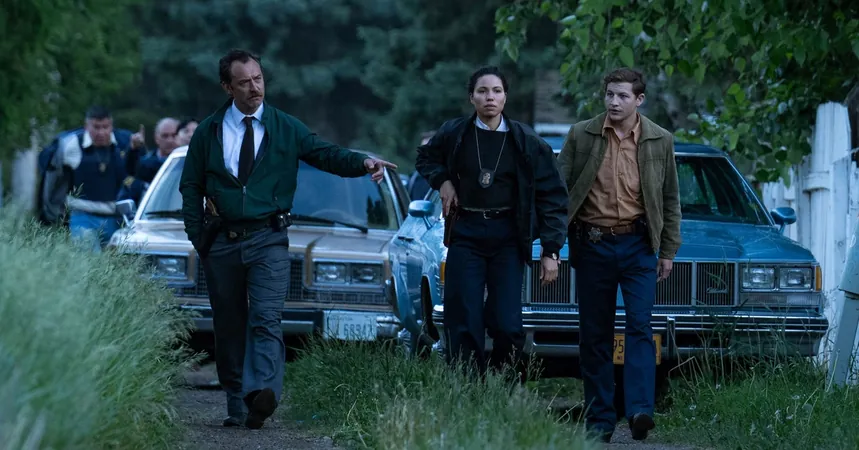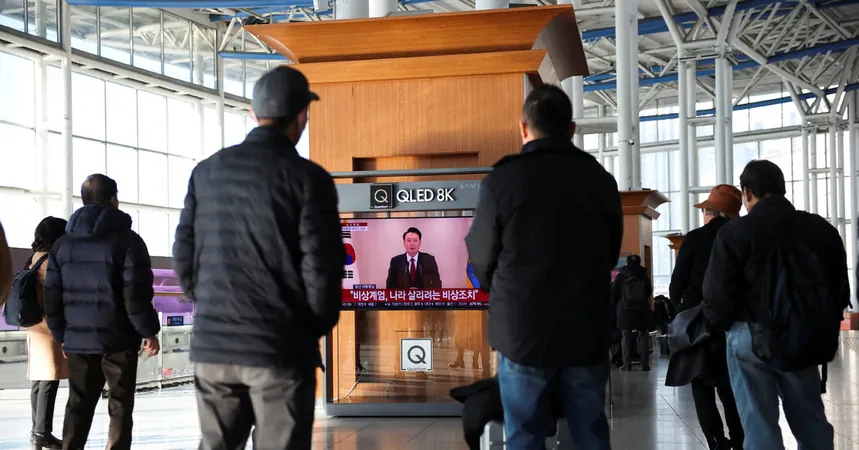
Unraveling the Dark Legacy of 'The Order': A Chilling Exploration of Extremism
2024-12-06
Author: Yan
Introduction
In Justin Kurzel's gripping film, *The Order*, viewers are introduced to an unsettling narrative that pulls from the harrowing text of *The Turner Diaries*, a notorious novel outlining a violent race war and the ultimate overthrow of the American government by white supremacists. Jude Law delivers a haunting performance as Terry Husk, a beleaguered FBI agent who delves into this grim world filled with diagrams of bombings and targeted killings, his obsession slowly unraveling a larger tapestry of extremism woven into American history.
Manifesto of Terrorism
The movie highlights a chilling progression as a young sheriff, played by Tye Sheridan, breaks down a six-step manifesto pulled directly from the infamous text. "Recruiting, fundraising, armed revolution, domestic terror, assassination, and finally, the day of the rope," he recounts, with the gravity of their implications weighing heavily on him. This book, first published in 1978, has been cited as a key inspirator for various extremist groups and figures, including Timothy McVeigh, who was involved in the Oklahoma City bombing.
Pivotal Characters
One of the film’s pivotal characters is Bob Mathews, portrayed by Nicholas Hoult. Mathews was the real-life head of the Silent Brotherhood, a white supremacist organization known for their criminal exploits which included bank robberies and counterfeiting. Despite Mathews' claims of minimal influence from *The Turner Diaries*, his group adopted the moniker *The Order*, echoing the novel's name for its militant protagonists. The film does more than just dramatize Mathews' life; it serves as a reflection on the pandemic of hate and violence still plaguing contemporary society.
Historical Context
Drawing inspiration from the significant yet largely overlooked historical events associated with Mathews and his cohorts, *The Order* cleverly reintroduces the revival of the extreme right in America. It shines a spotlight on the 1984 assassination of Jewish talk radio host Alan Berg, a brutal act committed by Mathews' followers that shocked the nation. This tragic event resonated enough to inspire Hollywood adaptations like *Betrayed* and Oliver Stone's *Talk Radio*.
Contemporary Echoes
Screenwriters Zach Baylin and producer Bryan Haas embarked on this project with keen awareness of the underlying connections that reverberate today—a resurgence in far-right ideologies, reminiscent of the chaos seen during the 2016-2020 U.S. political climate. When researching for the film, they came across the Silent Brotherhood through a deep dive into the broader narrative of American extremism, specifically citing events like the Ruby Ridge standoff and the ideologies of militia movements from the 1990s.
Reflections on Extremism
Drawing parallels between the film's historical context and today’s socio-political landscape, the production team was mindful of the contemporary echoes of the violent extremism portrayed on-screen. Director Justin Kurzel notes how the imagery of gallows outside the Capitol during the January 6 insurrection eerily surfed into their narrative focus, making the past feel alarmingly present.
Character Dynamics
The film’s portrayals lead audiences toward a better understanding of the sinister allure held by charismatic extremist figures who manipulate individuals in times of societal distress. Law and Hoult’s intricate performances mirror the complex relationship between Husk and Mathews as they each become the dark reflection of the other—a cat-and-mouse game steeped in psychological tension.
Modern Extremism
Mathews and his ideology continue to inspire nefarious elements into today's society, resonating through groups like Atomwaffen Division and the Terrorgram Collective, which draw on similar themes of racial purity and violence as found in *The Turner Diaries*. The chilling narrative of how extremist ideologies permeate modern discourse is underscored in the film, as well as the serious implications they hold in the breakdown of community relations and societal norms.
Conclusion
Ultimately, *The Order* seeks not only to recount these dark chapters in history but also aspires to remind viewers of the continual presence of domestic extremism. Producer Bryan Haas emphasizes the urgency of understanding these issues, stating, “If you don’t learn from history, you’re doomed to repeat it,” hinting at the real dangers lurking behind the charismatic figure of radical leaders in everyday communities today.
As we approach award season this December, the film aims to spark much-needed conversations around radicalization and the potent consequences of ideological extremism in America, urging viewers to remain vigilant about the lessons of history as we navigate current socio-political terrains filled with fear, division, and uncertainty.



 Brasil (PT)
Brasil (PT)
 Canada (EN)
Canada (EN)
 Chile (ES)
Chile (ES)
 España (ES)
España (ES)
 France (FR)
France (FR)
 Hong Kong (EN)
Hong Kong (EN)
 Italia (IT)
Italia (IT)
 日本 (JA)
日本 (JA)
 Magyarország (HU)
Magyarország (HU)
 Norge (NO)
Norge (NO)
 Polska (PL)
Polska (PL)
 Schweiz (DE)
Schweiz (DE)
 Singapore (EN)
Singapore (EN)
 Sverige (SV)
Sverige (SV)
 Suomi (FI)
Suomi (FI)
 Türkiye (TR)
Türkiye (TR)